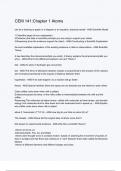-
1. Exam (elaborations) - Chapter 8_ lesson 4 indiana laws and rules (1)
-
2. Exam (elaborations) - Ch 11 va state life and health insurance exam (1).
-
3. Exam (elaborations) - Cem 141_chapter 1 atoms (1) questions & 100% verified correct answers with complete ...
-
4. Exam (elaborations) - Cem 141_ vsepr (1 questions & 100% verified correct answers with complete solutions ...
-
5. Exam (elaborations) - Cem 141_ stoichiometry (1). questions & 100% verified correct answers with complete ...
-
6. Exam (elaborations) - Chemistry 141 exam 1 (1) questions & 100% verified correct answers with complete sol...
-
7. Exam (elaborations) - Chemistry 141 exam -2 questions & 100% verified correct answers with complete soluti...
-
8. Exam (elaborations) - Chemistry 141 - learning objectives for chapter 4 questions & 100% verified correct ...
-
9. Exam (elaborations) - Chemistry 141 - learning objectives for chapter 4 questions & 100% verified correct ...
-
10. Exam (elaborations) - Chapter exam - indiana laws and rules (3). questions & 100% verified correct answers...
-
11. Exam (elaborations) - Chapter exam - indiana laws and rules (2) questions & 100% verified correct answers ...
-
12. Exam (elaborations) - Cem 141 final exam pt 3 (real exam 3, mock exam 3, pp lecture 26-35) (1)
-
13. Exam (elaborations) - Cem 141 final exam mock quizzes (1). questions & 100% verified correct answers with ...
-
14. Exam (elaborations) - Cem 141 final exam (1) questions & 100% verified correct answers with complete solut...
-
15. Exam (elaborations) - Cem 141 recitation week 3 questions & 100% verified correct answers with complete so...
-
16. Exam (elaborations) - Cem 141 msu final exam (1). questions & 100% verified correct answers with complete ...
-
17. Exam (elaborations) - Cem 141 msu exam 2 questions & 100% verified correct answers with complete solution...
-
18. Exam (elaborations) - Cem 141 module 1 questions & 100% verified correct answers with complete solutions ...
-
19. Exam (elaborations) - Cem 141 mock exams questions & 100% verified correct answers with complete solution...
-
20. Exam (elaborations) - Cem 141 final exam study guide (1) questions & 100% verified correct answers with co...
-
21. Exam (elaborations) - Cem 141 exam -3 (1) questions & 100% verified correct answers with complete solution...
-
22. Exam (elaborations) - Cem 141 e2 (1) questions & 100% verified correct answers with complete solutions (la...
-
23. Exam (elaborations) - Cem 141 chapter 5 questions & 100% verified correct answers with complete solutions...
-
24. Exam (elaborations) - Cem 141 final (1) questions & 100% verified correct answers with complete solutions ...
-
25. Exam (elaborations) - Cem 141 exam 3 practice questions & 100% verified correct answers with complete solu...
-
26. Exam (elaborations) - Cem 141 exam 3 msu
-
27. Exam (elaborations) - Cem 141 exam 3 questions & 100% verified correct answers with complete solutions (la...
-
28. Exam (elaborations) - Cem 141 exam 1 msu pollock (1). questions & 100% verified correct answers with compl...
-
29. Exam (elaborations) - Cem 141 exam 1 (1). questions & 100% verified correct answers with complete solution...
-
30. Exam (elaborations) - Cem 141 exam _s 2 questions & 100% verified correct answers with complete solutions...
-
31. Exam (elaborations) - Cem 141 chapter 1 learning objectives (1)
-
32. Exam (elaborations) - Cem 141 chapter 1 (1).
-
33. Exam (elaborations) - Cem 141 215 (1) questions & 100% verified correct answers with complete solutions (l...
-
34. Exam (elaborations) - Cem 141 -3 (1). questions & 100% verified correct answers with complete solutions (l...
-
35. Exam (elaborations) - Cem 141 (1) questions & 100% verified correct answers with complete solutions (lates...
-
36. Exam (elaborations) - Cem 141 chapter 4 (1) questions & 100% verified correct answers with complete soluti...
-
37. Exam (elaborations) - Cem 141 chapter 3 test questions & 100% verified correct answers with complete solut...
-
38. Exam (elaborations) - Cem 141 chapter 3 origin of atoms questions & 100% verified correct answers with co...
-
39. Exam (elaborations) - Cem 141 chapter 3 and 4 learning objectives questions & 100% verified correct answe...
-
40. Exam (elaborations) - Cem 141 chapter 2 and 3 learning objectives questions & 100% verified correct answer...
-
41. Exam (elaborations) - Cem 141 - chapter 5 learning objectives questions & 100% verified correct answers wi...
-
42. Exam (elaborations) - Cem 141 - chapter 2 questions & 100% verified correct answers with complete solutio...
-
43. Exam (elaborations) - Ca life & health insurance exam (1). questions & 100% verified correct answers with ...
-
44. Exam (elaborations) - Arkansas health and accident practice exam questions & 100% verified correct answer...
-
45. Exam (elaborations) - Arizona life and health insurance state exam simulator (1). questions & 100% verifie...
-
46. Exam (elaborations) - Cem 141 - si units & conversions (1) questions & 100% verified correct answers with ...
-
47. Exam (elaborations) - Cem 141 - final review questions & 100% verified correct answers with complete solu...
-
48. Exam (elaborations) - Cem 141 - exam 2 (chapters 2 and 3) (1). questions & 100% verified correct answers w...
-
49. Exam (elaborations) - Cem 141 - cumulative final (1)
-
50. Exam (elaborations) - 200 questions texas life insurance only state exam simulator questions & 100% verifi...
-
Show more




